
Young Water Professional Shares her Experience of a Visit to K-water
- Date 2020-07-15 10:52
- CategoryStory
- Hit2171
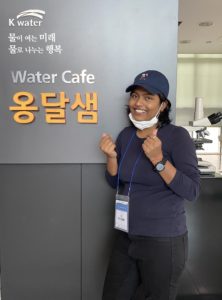 KDI School recently organized a field trip to K-water, the governmental agency responsible for comprehensive water resource development and the provision of both public and industrial water in South Korea. The number of student participants, however, had to be limited due to Covid-19 protocols. One of our students, Omi Kumari, shares her experience of visiting the plant with us. A graduate of the Indian Institute of Technology, Gandhinagar, one of India’s premier institutes, Omi is a geographer who has focused her research on "Water Governance." She has been associated with the International Water Association (IWA) as a member of the Emerging Water Leaders Forum. She also served as a panelist at the 2019 International Water Congress organized by IWA. A young professional herself, she discussed the role of young professionals in the field of water management.
KDI School recently organized a field trip to K-water, the governmental agency responsible for comprehensive water resource development and the provision of both public and industrial water in South Korea. The number of student participants, however, had to be limited due to Covid-19 protocols. One of our students, Omi Kumari, shares her experience of visiting the plant with us. A graduate of the Indian Institute of Technology, Gandhinagar, one of India’s premier institutes, Omi is a geographer who has focused her research on "Water Governance." She has been associated with the International Water Association (IWA) as a member of the Emerging Water Leaders Forum. She also served as a panelist at the 2019 International Water Congress organized by IWA. A young professional herself, she discussed the role of young professionals in the field of water management.
How do you look at water management as a subject? What aspect of it do you think needs to be studied the most?
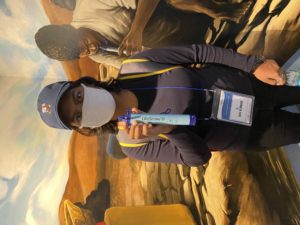 According to me, the approach that the subject of water management needs is interdisciplinary, since it is not limited to just technology or infrastructure, as usually perceived. There is an uneven distribution that you will understand with geography and, to study its accessibility, one needs a social lens. And cultural factors are really important, too. For example, in India, water is considered a "deity," which calls for a different approach to address water-related issues. So, I think this subject cannot be limited to a particular perception. In fact, in many of the failed cases, we find the cause to be a segregated approach to addressing issues related to water management.
According to me, the approach that the subject of water management needs is interdisciplinary, since it is not limited to just technology or infrastructure, as usually perceived. There is an uneven distribution that you will understand with geography and, to study its accessibility, one needs a social lens. And cultural factors are really important, too. For example, in India, water is considered a "deity," which calls for a different approach to address water-related issues. So, I think this subject cannot be limited to a particular perception. In fact, in many of the failed cases, we find the cause to be a segregated approach to addressing issues related to water management.
How was your experience with K-water (Korea Water Resources Corporation)?
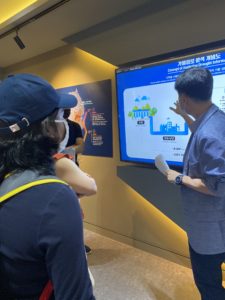 I am glad to have made it to this field visit, and there is a lot that I could absorb from this exposure to the K-water system. What intrigued me the most was the fact that the system has been centralized to share data amongst various government departments, so it can be integrated to have better planning and more. So, the same data is available to the citizens, and this transparency, I believe, is really important to further citizen participation because water management calls for a collective action. The other thing I liked was their association and cooperation with private manufacturers, innovators, and researchers, which could increase efficiency in my opinion. Because they have a chain that can eliminate repetition of effort due to shared expertise. Last, but not least, I love their equipment (laughs), and I am trying to procure them when I go back home. As a researcher, it was satisfying for me to have been there physically to witness the whole process of water management.
I am glad to have made it to this field visit, and there is a lot that I could absorb from this exposure to the K-water system. What intrigued me the most was the fact that the system has been centralized to share data amongst various government departments, so it can be integrated to have better planning and more. So, the same data is available to the citizens, and this transparency, I believe, is really important to further citizen participation because water management calls for a collective action. The other thing I liked was their association and cooperation with private manufacturers, innovators, and researchers, which could increase efficiency in my opinion. Because they have a chain that can eliminate repetition of effort due to shared expertise. Last, but not least, I love their equipment (laughs), and I am trying to procure them when I go back home. As a researcher, it was satisfying for me to have been there physically to witness the whole process of water management.
What are your plans after graduating and what would you take back from this experience at K-water to your professional life?
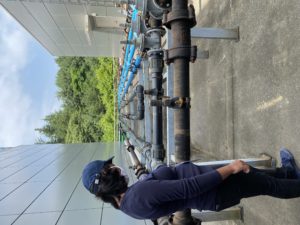 My region, Jharkhand, is particularly struggling with arsenic contamination of groundwater right now, and the majority of the population depend on this source for their daily chores. Due to continued usage of it, many people are getting chronic diseases. I wish to work towards managing this issue, increasing the supply of clean water, establishing a better water treatment infrastructure, and using my experience and what I’ve learnt at K-water, I would try to replicate the structure of central monitoring based on the requirement back home and definitely try to establish cooperation with the experts at K-water. I would also welcome more stakeholders outside the government and advocate new governance on the issue.
My region, Jharkhand, is particularly struggling with arsenic contamination of groundwater right now, and the majority of the population depend on this source for their daily chores. Due to continued usage of it, many people are getting chronic diseases. I wish to work towards managing this issue, increasing the supply of clean water, establishing a better water treatment infrastructure, and using my experience and what I’ve learnt at K-water, I would try to replicate the structure of central monitoring based on the requirement back home and definitely try to establish cooperation with the experts at K-water. I would also welcome more stakeholders outside the government and advocate new governance on the issue.
What is one thing you wish we could do to cope with the global water crisis?
The one thing we need to do is "collective action." And, for that, we need more stakeholders imbibed in a better management system, especially inclusive of students and young professionals. However, not limited to them. A sense of attachment towards our natural environment should be created. It would help the society to get the sense of its need, which would directly affect human behavior towards the environment and resources. So many problems, particularly water wastage, can be significantly tackled, if we come together as a society to understand the environment and develop management systems that are participatory and inclusive.
We wish Omi great success in her journey towards making water accessible and safe.
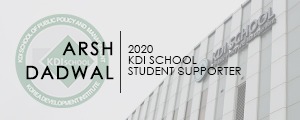
Related News
-
Research and Education7 days ago
Republic of Korea Economic Bulletin, May 2024#KDI #Economic #KDISCHOOL #kdischool #Economic Bulletin #Research
-
Research and Education35 days ago
Republic of Korea Economic Bulletin, April 2024#KDI #Economic #KDISCHOOL #kdischool #Economic Bulletin #Research
-
Research and Education63 days ago
Republic of Korea Economic Bulletin, March 2024#KDI #Economic #KDISCHOOL #kdischool #Economic Bulletin #Research
